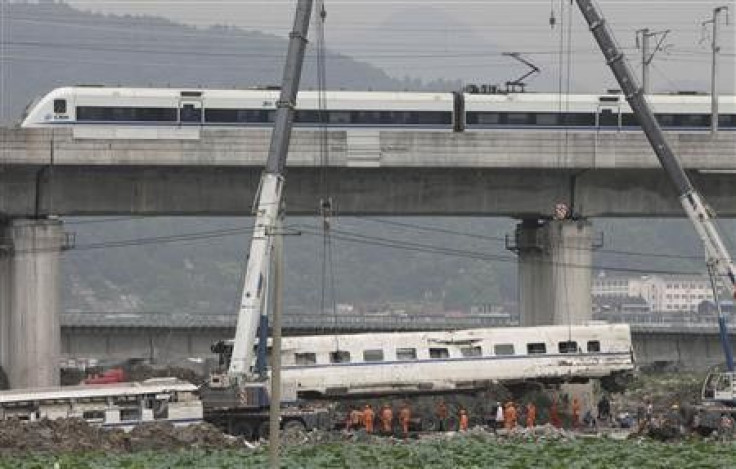China launches safety campaign after deadly train crash

China's rail minister, facing public outrage over Saturday's deadly train crash, has ordered a two-month safety review of railway operations and apologised for the accident which killed 39 people, state media reported on Tuesday.
Internet users have flooded websites and microblogs with angry comments following the crash in eastern China's Zhejiang province, the country's deadliest rail accident since 2008.
Even before the investigation into the cause of the crash was complete, Beijing sacked three middle-level railway officials on Sunday, hoping to assuage public fury.
Efforts by the propaganda department to bar Chinese media from questioning official accounts of the accident only fuelled the anger and suspicion.
Communist Party mouthpiece the People's Daily quoted Railways Minister Sheng Guangzu as saying a range of railway officials would be directed to work on front-line operations during the next two months and to learn from the accident.
He said the safety campaign will extend through the end of September and will focus on high-speed rail and passenger trains, such as implementing maintenance standards and reinforcing checks on power connections to pre-empt outages.
Special attention would also be paid to prevent accidents caused by flooding and inclement weather, the minister said.
The official Xinhua news agency, in a rare piece of criticism from mainstream state media, said the ministry's handling of the crash's aftermath had "done nothing to reassure the public of its professionalism".
"The ministry, as it monopolizes the country's rail transport, has long been dubbed ... 'big rail brother' for its indifference to passengers' needs," it said in the English language commentary.
"The ministry promised to refund passengers whose rail service was cancelled after the collision. However, many have found it outrageous that they were told to go back to the exact booth they purchased the ticket, which may be hundreds or thousands of kilometres away."
"ONLY DEVILS COULD BELIEVE"
Comments on China's popular Twitter-like microblogging site Weibo suggested the government will have to work very hard to subdue broad public anger at the crash.
In one online Weibo survey, 98 percent of more than 5,000 respondents answered "only devils could believe" the official death toll of 39.
"We've seen the kind-heartedness of the Chinese people (during this disaster) and the shameless avarice of those who govern us," wrote one person who goes by the name "well-behaved partition 57". "Those who lie to the great Chinese people should be made to pay the price."
The government has now begun paying compensation to the victims' families, with the first family accepting 500,000 yuan (47,244.57 pounds), according to Xinhua.
Police also released for the first time the names of 28 of the dead along with their places of residence and identity card numbers, Xinhua said. The list included two foreigners -- an Italian and a U.S. citizen.
The Global Times, a widely read tabloid published by the People's Daily, wondered in an editorial why China was able to develop so fast economically yet ignore safety standards taken for granted in the West.
"As the world is experiencing globalisation and integration, why can't China provide the same safety to its people?" it wrote.
But it also warned people not to jump to hasty conclusions.
"Criticism and punishment will certainly accelerate the process of becoming safer, yet blind and hasty finger-pointing should be avoided. China's development at this stage cannot be perfect."
The ministry is still investigating the cause of the accident. State media has said a bullet train hit another express that lost power following a lightning strike, adding that the power failure knocked out an electronic safety system designed to alert conductors about stalled locomotives on the line.
The accident has raised concerns about the safety of the country's high-profile and fast-growing rail network and threatens to undermine its plans to export high-speed train technology.
Separately, on Monday more than 20 trains were delayed for up to three hours due to a power outage on the flagship high-speed rail line between Beijing and Shanghai, the latest malfunction to plague the line since its grand opening in late June, local media reported on Tuesday.
The power cut happened after a storm in the central province of Anhui blew down an iron sheet, cutting off the power supply on Monday evening, the state-run Beijing News reported, citing an official from the Shanghai railway bureau.
© Copyright Thomson Reuters 2024. All rights reserved.











